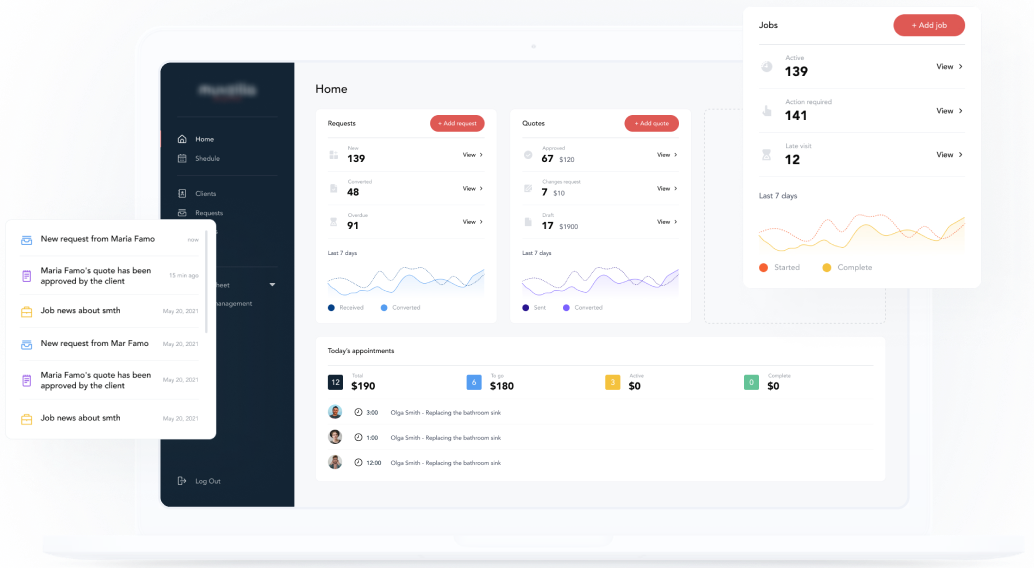With the pervading data obsession across all businesses, those who take control of their information will win the game. Accumulating information is only part of the job since data by itself is worthless unless it can bring practical value. What’s the practical value concerning data? It’s the opportunity to drive valuable insights and create a solid background for informed decisions.
Data engineering today becomes an inextricable part of business operations, and the specialists in this field are pushing the limits of new technologies to find new approaches to gathering, processing, and storing data.
Here, an ETL developer enters the scene. Whatever purpose you have while collecting data, you cannot use it in its initial format. Data processing includes taking information from storage and bringing it to a feasible format for further use. An ETL developer carries out this process by extracting, transforming, and loading data.
The article seeks the answers to the following
- What is ETL developer?
- What are their main duties?
- How to figure out when a company can benefit from such a specialist?
- Why are ETL professionals critical for modern enterprises?
What is ETL?
To start with, let’s focus on the very term ETL and discuss its constituents. What does the ETL abbreviation stand for?
- Extraction. Businesses collect data from abundant sources and store it in various formats. The source systems can include SQL servers, ERP, spreadsheets, data from vendors, and more. Extraction entails defining the data sources and gathering information.
- Transformation. Once the data has been collected from the sources, it must be validated before moving into the warehouse. The transformation stage includes the respective cleansing, mapping, and transformation of data.
- Loading. The ETL process finishes with loading the properly structured and formatted information into the target database. The type of database will depend on the required amount of data. Data warehouse, for instance, is used in big data management.
What is an ETL Developer?
ETL specialists are an essential part of data science teams. They master the ETL process from the ground up by studying, analyzing, and understanding the situation of a company concerning data. Subsequently, they design and develop the corresponding data storage systems.
Discover the key differences between outsourcing and outstaffing
ETL developer roles and responsibilities
When it comes to BI projects, ETL professionals perform a crucial engineering role. Their activities cover the following tasks:
ETL process management
ETL, as a component of data processing, requires the application of various methodologies and technologies. What does an ETL developer do in this regard?
- Plans the ETL process, establishing the framework for data processing;
- Develops system architecture for each element and the whole data pipeline;
- Outlines the system requirements and monitors system development;
- Participates in the development and implementation of ETL tools;
- Tests the tools and data pipelines.
Data Modeling Another fundamental step an ETL specialist has to take before extracting the information is determining which data formats are required. The ways data will be introduced in the user interface are referred to as data models. Below is an example of the data model for a bookstore.

The selected models will determine the transformation phase and dictate the technologies that will be utilized for formatting.
Data Warehouse Architecture ETL programmers structure the information in the large warehouses for simple and convenient use. Thus, the major data array is usually decomposed into smaller elements such as data marts. These are databases in which the information is thematically grouped, i.e. sales, marketing, accounting data, and more. See the example of basic data warehouse architecture below.

Data Pipeline Development After all system components are designed, it’s time to develop the data pipeline that automatically performs the following steps.
- Extraction of information from the indicated sources;
- Uploading data for further formatting;
- Formatting data according to the defined standards;
- Loading structured information into the warehouse.
ETL testing Apart from directly planning and developing a data storage system, an ETL developer job description includes testing the entire system and its components as well as checking the following areas:
- Data model;
- Data warehouse architecture;
- Representation tools;
- Data flow;
- The speed of uploading/downloading/querying;
- System performance.
Case Study: Home Services Management Platform

The skillset of an ideal ETL developer
To provide substantial value to a hiring company, an ETL developer should combine certain sets of technical and soft skills.
Technical Skills
Proficiency in one or more ETL tools (Informatica, Talend, SSIS, etc.); Expertise in PL/SQL and Oracle development; Good command of dimensional modeling techniques; Knowledge of scripting languages (Bash, Python, Perl) and programming languages (JavaScript, C++); Database engineering skills – SQL, NoSQL, Hadoop; Experience in warehousing architecture processes – MOLAP, ROLAP, EDW; Familiarity with Hadoop components including Sqoop, Hive, Spark, and more; Profound knowledge of OLAP, SSIS, SSAS, and MDX; Experience with modeling tools such as Toad Data Modeler and Erwin.
Soft Skills
- Data analysis and troubleshooting;
- Project management;
- Effective communication;
- Ability to estimate risks and solve technical issues;
- A holistic view of the data situation in a company;
- Effective collaboration within a team;
- Task organization and time management;
- Creativity, innovation, and an ability to think beyond boundaries
Therefore, a successful ETL developer must not only have a software engineering background and experience in database development but also be a cool manager and possess interpersonal skills and be creative enough to think out of the box. In our company, we pay particular attention to the multifaceted development of our programmers. We believe this provides an excellent background for designing extraordinary solutions.
How Much Does an ETL Developer Earn?

In the United States, an experienced ETL Developer can expect to receive $112,026 per year. This is the average number that is composed of the base pay and additional pay, which are estimated, respectively, at $98,251 and $13,775 per year. Additional pay typically includes bonuses, tips, commission, and other kinds of payments. The salaries by the leading US companies fall within the "Most Likely Range" that spans from $72,000 to $177,000.
When Does an Organization Need an ETL Engineer?
There are different types of data engineering specialists, and chances are, that the company needs will be covered by other professionals. However, if an organization is building a large data processing system with a complex flow of data, and ETL developer would be indispensable.
Your next great idea deserves expert software
In a nutshell, the business situations when an ETL developer can make a difference include the following.
- Your IT team fails to efficiently leverage the information to keep pace with the growing business;
- You plan to extend the current data processing system or build a new, larger one;
- You have plenty of data-driven activities or business intelligence and machine learning projects.
According to our experience in data science, it’s reasonable to outsource ETL developers. This approach will save you time and costs since you will skip the hiring stage and get a dedicated team with the relevant experience that would work out the optimal solution for your specific purposes.
Conclusion
To sum up, the ETL developer meaning in the process of mastering data is hard to overestimate. An ETL specialist is a person who helps your organization to make use of its powerful asset – information. Modern technologies allow accumulating tons of data, while the success of your business is often dictated by whether you can manage it properly. If you reveal the need for an ETL engineer, you should know that finding an effective candidate can become a challenge. Plenty of programmers today prefer to narrow down their specialization and do not possess equally good business management and coding skills.
Obtaining the winning qualifications is possible when you cooperate with a dedicated software development team like Requestum. We successfully combine a scientific approach, critical thinking, and superior engineering skills to create impactful digital experiences. Share your ideas with us, and we will help every bit of information work for your business goals and keep bringing fruits in the long term.

Our team is dedicated to delivering high-quality services and achieving results that exceed clients' expectations. Let’s discuss how we can help your business succeed.




SHARE: